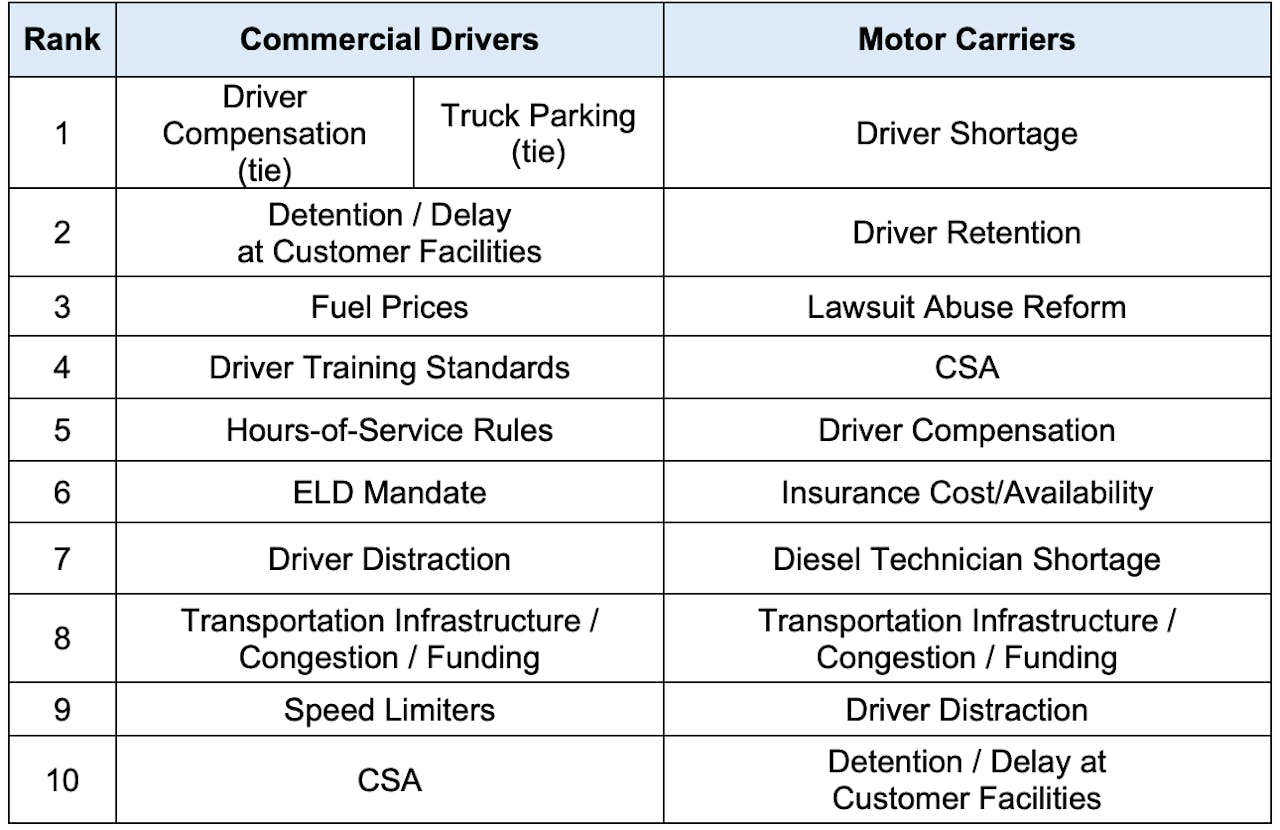Rebecca Brewster, the president and CEO of the American Transportation Research Institute, spoke to fleet executives at Overdrive sister publication Commercial Carrier Journal's Solutions Summit in Phoenix, Arizona, last week about clashes between the priorities of large fleets and their drivers. According to Brewster, and the data, while fleets remain concerned about staffing challenges, the drivers they're looking to employ mostly worry about kitchen-table issues, like how they'll pay their bills and whether or not they'll have a safe place to sleep tonight.
While Brewster's speech focused mainly on the results of a new survey on what drives the choice between equipment ownership or work as a company driver, she also provided compassionate and detailed analysis of the hardships many drivers face daily.
Here's a look at the breakdown of the top ten concerns for both fleets and drivers.

While the debate around driver compensation v. a perceived "driver shortage" is well-worn, Brewster pointed to driver concern around truck parking as cause for a major wakeup call for fleets.
"If your top issues are finding and keeping drivers, then please pay attention to what they’re concerned about," Brewster told the fleet-focused audience. "We have a tie for the first time in the top spot between compensation and truck parking" on the truck operators' side of the ledger.
Most likely, drivers will always push for higher pay and fleets will always lament the lack of drivers willing to work under current conditions, but according to Brewster, the issue with truck parking is untenable and simply not something workers of any type should contend with.
"The lack of truck parking is a big personal issue for me," she said, pointing out that many of the conference attendees likely drove past trucks parked on the shoulders and ramps of highways for lack of parking. "It should not be occurring. This is an untenable position drivers are faced with."
Fleet executives, according to Brewster, can't just accept these hardships on behalf of their drivers, especially within such a tight freight market. "If you want to talk about finding and keeping drivers, you need to be equally concerned" with the lack of safe parking, she said. "Everyone in this room knows where you’re going to put your head down in a bed tonight. Our professional drivers don't have that same luxury."
Besides the obvious ethical case to be made for finding safe places for truck drivers to park, Brewster's analysis of the industry illustrated several ways in which the shortage of parking may indeed even be causing the "driver shortage" that tops the list of fleet concerns.
Truck parking the key to undoing the so-called 'driver shortage'?
MIT's Dr. David Correll, a research scientist who spent the last four years observing and talking to 4,000 OTR drivers, recently made headlines for a study that concluded that despite drivers having a potential 11 hours of driving time per day, the average he observed drove just 6.5 hours. The "driver shortage" of 80,000 drivers, an estimate from the American Trucking Association, could therefore be solved with an additional 18 more minutes of drive time a day achievable in every driver's current schedule.
Previous ATRI research has indicated that 44% of drivers found truck parking much harder or somewhat harder than in years past. Brewster attributed this in part to public rest areas closing during the COVID pandemic.
Brewster recalled a 2016 study where ATRI "actually had drivers keep a good old-fashioned diary of everything about their truck parking," wherein drivers reported a troubling frequency of unauthorized, undesignated parking. The diaries also found drivers spending an average of 56 minutes a day looking for parking.
'Why were drivers giving up hours? Even if they have more drive time they'd say 'I’m just afraid I won’t be able to spend it and find parking,'" said Brewster.
The parking issue also blends into drivers' No. 2 concern: Detention times. Despite seemingly endless attention to logging and reporting hours of service, the truth of the industry is that most drivers don't run out of drive time. Rather, they run out of time to wait on parking or loading and unloading.
[Related: And the No. 1 barrier to truckers' hours utilizaiton is ...]
Brewster said shippers and fleets can demand that warehouses allow drivers to use the facilities and to park on-site, when needed, but that fleets should also advocate for their drivers politically. Besides pushing for more money for truck parking in federal budgets, as OOIDA has done, they can contact their local authorities.
"Please make sure your state DOT understands that closing rest areas is a bad thing to do for the industry, whether it’s a short-term solution [as during the pandemic] or long-term for budget issues," said Brewster. "And talk to your customers. They have a role in this, a very big role. Particularly if they’re going to be holding their driver up for a long time. Warehouses can’t say, 'Sorry, too bad for you, you have to go park down the street.' They have to provide a safe haven."
In that same vein, Correll suggested that carriers and drivers should create a system to give warehouses and shippers letter grades, to help guide them when selecting loads just like you might use a health department letter grade to help you pick a restaurant.
from Overdrive https://ift.tt/3IsJEdC



Sourced by Quik DMV - CADMV fleet registration services. Renew your registration online in only 10 minutes. No DMV visits, no lines, no phone mazes, and no appointments needed. Visit Quik, Click, Pay & Print your registration from home or any local print shop.

No comments:
Post a Comment